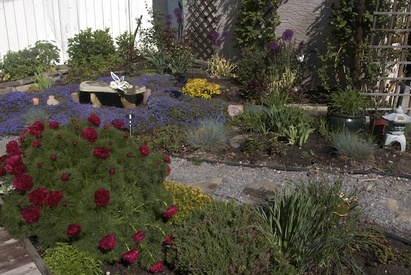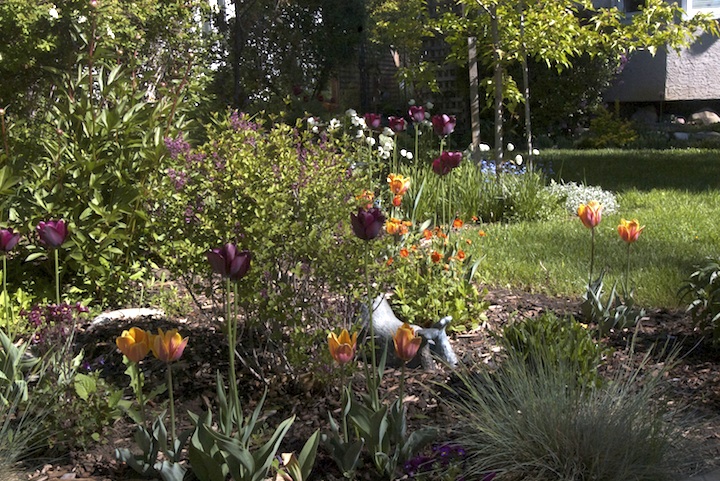Pentecost in the Garden
By Richard Burke

It’s either in the grand design or simply timing that Pentecost coincides with planting our gardens. I suspect it’s by design.
Pentecost, as Catholics would know, is a “movable feast” whose date is determined by Easter. The date ranges from May 10 to June 13. Gardening around our place actually started closer to Easter, outside for lettuce and spinach which can withstand some cool evenings, and seeding other, more tender plants inside the greenhouse. But, for most, the real outside garden work, planting that is, doesn’t often start before the May long weekend, although that varies depending on weather, usually.
The feast celebrates the Holy Spirit descending on the 12 apostles. They were the first recipients of the gifts of the Holy Spirit. Applying the gifts to our lives can be accomplished in myriad ways. It’s not a stretch to consider how well they fit in the garden context.
It’s said that God’s children can bear much fruit by the power of the Holy Spirit, an obvious garden reference. The analogy extended suggests “he who has grafted us onto the true vine will make us bear the fruit of the Spirit,” among them:
• Love – for the infinite wonders of colour, texture, form, function, process, taste, wholesomeness, beauty, etc. the Holy Spirit created in the garden.
• Joy – at seeing a seedling sprout, grow, mature and produce seed for a future generation.
• Peace – from the sound of a waterfall, the rustle of leaves, the chirping of birds. Ornamental gardens in particular provide an environment of peace and tranquility.
• Patience – waiting for the seeds to germinate, the blossoms to open and the fruit to ripen.
• Kindness – around the bird feeders and bird baths, sharing the garden with neighbours and appreciative passers-by.
• Goodness – the harvest; the scent of a blooming dwarf Korean lilac or peony.
• Faithfulness – tending, weeding, watering judiciously.
• Gentleness – transplanting tender seedlings; avoiding the robin’s nest, if possible, while mom tends her little ones.
• Self-control – suggesting the discipline it takes to care for the garden to its maturity.
It wouldn’t be difficult to conclude God intended for us to be gardeners to experience the Holy Spirit.
Pentecost, as Catholics would know, is a “movable feast” whose date is determined by Easter. The date ranges from May 10 to June 13. Gardening around our place actually started closer to Easter, outside for lettuce and spinach which can withstand some cool evenings, and seeding other, more tender plants inside the greenhouse. But, for most, the real outside garden work, planting that is, doesn’t often start before the May long weekend, although that varies depending on weather, usually.
The feast celebrates the Holy Spirit descending on the 12 apostles. They were the first recipients of the gifts of the Holy Spirit. Applying the gifts to our lives can be accomplished in myriad ways. It’s not a stretch to consider how well they fit in the garden context.
It’s said that God’s children can bear much fruit by the power of the Holy Spirit, an obvious garden reference. The analogy extended suggests “he who has grafted us onto the true vine will make us bear the fruit of the Spirit,” among them:
• Love – for the infinite wonders of colour, texture, form, function, process, taste, wholesomeness, beauty, etc. the Holy Spirit created in the garden.
• Joy – at seeing a seedling sprout, grow, mature and produce seed for a future generation.
• Peace – from the sound of a waterfall, the rustle of leaves, the chirping of birds. Ornamental gardens in particular provide an environment of peace and tranquility.
• Patience – waiting for the seeds to germinate, the blossoms to open and the fruit to ripen.
• Kindness – around the bird feeders and bird baths, sharing the garden with neighbours and appreciative passers-by.
• Goodness – the harvest; the scent of a blooming dwarf Korean lilac or peony.
• Faithfulness – tending, weeding, watering judiciously.
• Gentleness – transplanting tender seedlings; avoiding the robin’s nest, if possible, while mom tends her little ones.
• Self-control – suggesting the discipline it takes to care for the garden to its maturity.
It wouldn’t be difficult to conclude God intended for us to be gardeners to experience the Holy Spirit.
